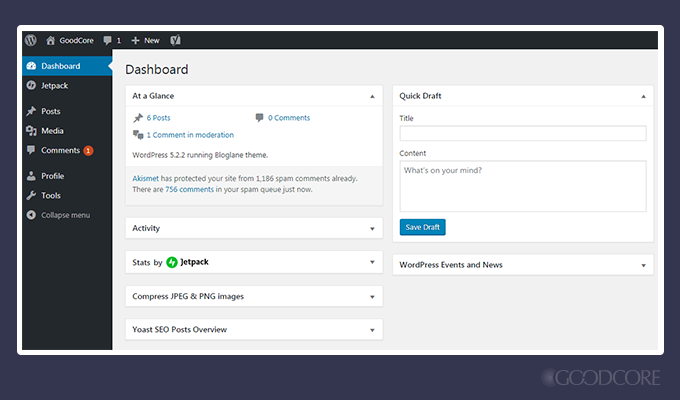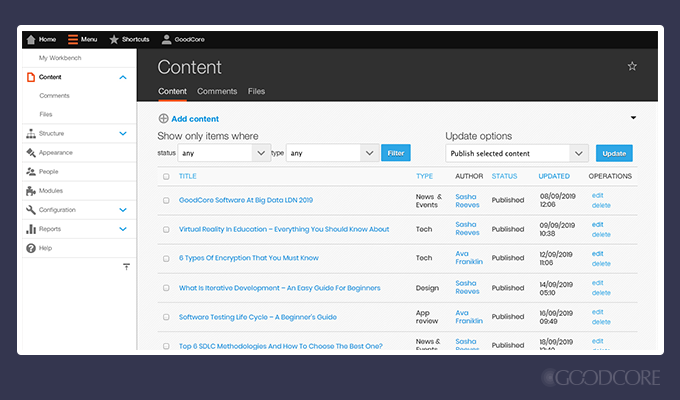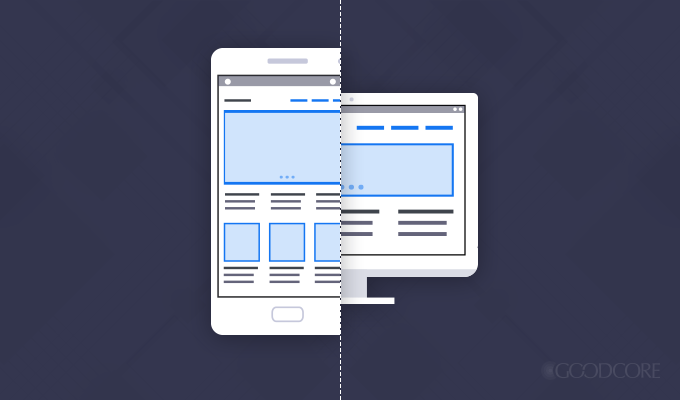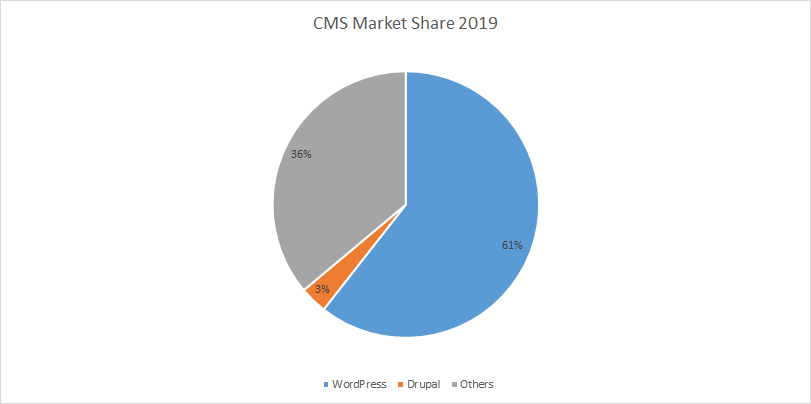You might have heard a lot about WordPress, either through an influencer or through someone who works at a website development agency. But have you heard about other content management systems (CMS)?
In this article, we will compare Drupal vs WordPress, two popular CMSs that offer a number of great features and advantages.
As you know, every content management system, including Drupal and WordPress, has distinct features that make it stand out from the rest. First, we will explore what exactly these two content management systems are. Then, we will shift our focus towards the great debate that is “WordPress vs Drupal: which one is better?” In doing so, we will compare the features, pros, and cons of both the systems.
Before we move on to the comparison, let’s have a look at what exactly Drupal and WordPress systems are.
What Is WordPress?
Introduced in 2003 as a blogging platform, WordPress, a content management system (CMS), has become a go-to choice for many people over the years. This is because, as an open-source website creation tool, it is perhaps the easiest and most powerful system as compared to the other systems. Anyone can build their website on WordPress without any professional help.

WordPress has approximately 60% of the market share and powers 34% of all the websites.
What Is Drupal?
Coming onto our second content management system, you must already be thinking, “What’s better than WordPress?” or maybe “What does Drupal do? Is it just like WordPress?”
Like WordPress, Drupal is also an open-source content management system. It was launched in the year 2000, three years before WordPress. It is mostly preferred by businesses and governments due to its efficient security and customisation exactly according to one’s needs and requirements. Anyone can build their website but they might need a professional to upgrade it.

It has a total of 4.6% market share and powers 2.3% of all the websites.
Drupal vs WordPress: A Comparison
Now that we know exactly what Drupal and WordPress are, let’s have a look at how are they different from each other. In this section, we will discuss the pros and cons of Drupal and compare them with the pros and cons of WordPress.
So let’s get started with our discussion on the few most important factors that determine the difference between WordPress and Drupal.
1. Functions
WordPress
Through its vast number of themes and plug-ins, WordPress allows you to customise your website on your own. You can select a theme and modify it according to your needs without having any prior knowledge of coding.
The themes and plug-ins boost the functionality of your website. With more than 50,000 plug-ins and 6800+ free themes, along with premium options such as customising admin menu, managing user permissions, caching your website, etc., you can revamp your entire website to attract your target audience.

Drupal
There is a major difference in the number of available features when comparing Drupal vs WordPress. Drupal has many advanced features which WordPress lacks. If you do not learn how to use them, you might miss out on a lot of unexplored options that could have given your website an edge over other websites. Also, a thorough exploration will create a learning curve for you when it comes to handling taxonomies, views, content types, etc.
Due to these well-defined features, it can handle your complex requirements efficiently. You can have a role-based system with site admins and content editors, and give individual access to private content. You can also create multiple custom roles, such as administrator, anonymous user, authenticated user, etc.
With over 38,000 plug-ins (“modules”) and more than 3500 themes, you can build an amazing, highly customisable website for your business.
2. Design & Development
WordPress
Originally developed as a blogging platform, WordPress has turned into a proper content management system which is not only SEO-friendly but also social media savvy. Yet it fails to handle a large volume of content.
Users can fully customise their website without requiring assistance from the developer. The built-in plug-ins allow users to make design and functionality changes. For instance, you can completely customise your website’s front end, choosing your own colour scheme, site design, menus, background and header images, widgets, and much more.

Drupal
Designed with the aim of custom development, a website on Drupal cannot be developed without the assistance of a professional software developer. Therefore, you will need the developer to install, update, or extend modules on Drupal. But then why use Drupal at all?
When comparing Drupal vs WordPress,we observed that since Drupal is built for custom development, it can support a larger amount of content as well as a higher number of users at a time. It has built-in site caching function along with multilingual support, which WordPress lacks. In other words, it is more efficient than WordPress.
Furthermore, when you are already taking assistance from a developer, you can make direct changes in the parent files. Since there is nothing that you cannot customise, you can transform your vision to reality with a great level of accuracy, provided that you have at least some professional assistance
3. Security
WordPress
When it comes to the security of WordPress vs Drupal, the former is secure but its third-party extensions are highly vulnerable to hackers and other threats. Therefore, when using WordPress Engine, WordPress’ own hosting platform, it becomes relatively easy to avoid all the risks.
Most security issues, such as hacking, that are faced by WordPress websites are caused by insecure log-in credentials and flawed coding. If you want to avoid that route, make sure that you choose themes and plug-ins in WordPress that are safer.
By using WordPress brute force protection plug-ins, you can build a safe and secure website. The good news is that all the latest versions of WordPress perform automatic maintenance and security updates.

Drupal
Drupal, on the other hand, is much more protected, with monthly security updates being released. Because of its custom-built modules and themes created by developers, there is hardly any room for security threats. Even if any vulnerability shows up, the platform is quick to combat it.
To ease your problem, it publishes detailed security reports too. Furthermore, it has a separate module which produces security reports at the back-end, which enables you to spot and fix any flaw then and there.
4. Mobile/Responsive
WordPress
In terms of the mobile-friendliness of WordPress vs Drupal, the former wins. Each theme and/or plug-in on WordPress automatically adjusts itself when the website is viewed on a mobile device. You might also find some plug-ins to support Google’s Accelerated Mobile Pages.

Drupal
In the case of Drupal, there are plenty of themes that make sure that your website is mobile-friendly. Both aesthetics- and functionality-wise, it is operable through mobile devices.
5. Cost
WordPress
WordPress, as compared to Drupal, is more cost-friendly. As mentioned earlier, it offers a vast number of free themes and plug-ins that make it easy for the user to design and develop their website from scratch. Hence, a lot of users find it affordable. However, if you opt for premium website upgrades, then it is likely that you will have to invest more resources.
Secondly, since WordPress is the go-to option for almost every website developer, you can easily find professional help in installing and/or upgrading its complex plug-ins and themes. So if you are looking for cost-effective ways to build your website, WordPress is the way to go.

Drupal
When it comes to the costliness of Drupal vs WordPress, the former proves to be a little more expensive. Drupal was initially developed with one goal in mind: fast performance. Due to its complex nature, users have always required developers to assist them throughout the development phase, incurring high costs in terms of both time and money. On top of that, Drupal developers are not as readily available as WordPress developers are.
6. Ease of Use
WordPress
Considering all of the above factors, if you are not a developer and just a non-technical person planning to start a website on your own, WordPress, as compared to Drupal, is exceptionally user-friendly. With an easy installation process and through its WYSIWYG Theme Customiser and Gutenberg editor, it makes one’s job easy to develop an amazing website without having any prior knowledge of it and without requiring any programming skills.
Furthermore, its user interface is simple and offers one-click upgrades to users. Even if you require more complex layouts, you can do so through page builders without having to turn towards actual coding.
Should you face any problem, the WordPress community is always there to support and help you out since WordPress is a go-to choice for a large number of people.

Drupal
Its user interface may intimidate you at first. However, if you try to navigate through it, you will be able to familiarise yourself with it after spending some time on it. Once you gain some experience, you will be able to produce amazing custom-built websites for yourself by incorporating your requirements.
When talking about the usability of Drupal vs WordPress, the former requires that you know the basics of PHP, HTML, and CSS. Otherwise, you will be a little lost because most modules and themes are custom-coded to meet the developer’s needs. In other words, you must have substantial technical experience to be able to operate Drupal.
Is Drupal Harder Than WordPress?
Are you still not clear about the features of Drupal and WordPress? Don’t worry! To make a clear distinction between Drupal vs WordPress, we have compiled the pros and cons of Drupal against the pros and cons of WordPress side by side so that you can make an informed decision.
| DRUPAL | WORDPRESS | |
| Market Share | 4.6% | 59.8% |
| Architecture | Presentation-abstraction control architecture | Front controller architecture |
| Software | Free and open source | Free and open source |
| Programming Language | Written in PHP using Symfony | Written in PHP and based on MySQL |
| Application | Preferable for large content-based websites | Preferable for small content-based websites |
| Extensions/plug-ins | Over 38,000+ | Over 50,000+ |
| Free Themes | Over 3500+ | Over 6800+ |
| Multilingual | Built-in multilingual functionality | Plug-ins enabled multilingual |
| Complexity | Complex | Simple |
| Customisation | Provides fewer features for customisation | Themes and plug-ins help in better customisation |
| User Interface | Not user-friendly | User-friendly |
| Security | High security | Vulnerable to security threats |
| Support | Limited community support | Extensive community support |
| Cost-Effective | Not so much | Yes |
What’s More Popular, Drupal or WordPress?
Before we give our final verdict on the Drupal vs WordPress debate, here are a few more statistics that will help you further assess which content management system, Drupal or WordPress, is right for you according to your requirements.

The information compiled by W3Techs shows us the market shares of various content management systems in 2019. We have chosen to focus on the market shares of Drupal vs WordPress. The chart above shows that WordPress has the most significant share in the market, which indicates that it is highly preferred by developers, bloggers, businesses, governments, etc. Drupal, on the other hand, has a meagre 3.6% market share.
This Drupal vs WordPress Google Trends chart testifies further that WordPress has been most searched from January 2019 to November 2019 as compared to Drupal, which has a much lower search volume.
To summarize, this WordPress vs Drupal comparison tells us that the former is perhaps the most popular CMS.
Which One Should You Choose?
This discussion comes down to the main question: which one to choose, Drupal or WordPress? Is WordPress better than Drupal? Or is Drupal better than WordPress?
After listing out all the essential features of both Drupal vs WordPress along with comparing them side-by-side, it is justified to say that WordPress is a go-to choice for most people. In other words, it has an edge over Drupal in terms of usability, adaptability, cost and functionality. People can efficiently operate WordPress without any professional help. In fact, they can learn the system entirely on their own.
That in no way suggests that Drupal has no plus points. The facts and figures show us that Drupal is better than WordPress in terms of security and customisation. It allows users to fully develop their websites, albeit with the assistance of a professional developer, which might cost you money and time.
Concluding Remarks
This Drupal Vs WordPress debate can have no definitive outcome. In fact, it will only intensify over the coming periods as both the CMSs are continually keeping up with the changing trends in the technology industry.
However, your decision to choose Drupal or WordPress should be based on your needs and requirements. To make that informed decision, you must be aware of the features of both the content management systems.
If you are interested to know which content management system GoodCore prefers, leave your comments and/or queries down below. We will be happy to let you know our stance and answer any queries. We would also love to know your thoughts on this WordPress vs Drupal discussion.





